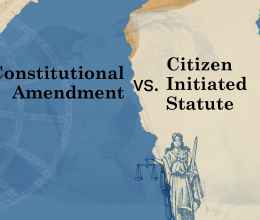Youth justice systems were created to protect young people’s rights and focus on education and rehabilitation rather than punishment. Since the early 20th century, youth have been separated from the adult criminal legal system because they are at an earlier developmental stage and have a unique capacity to change. Ohio was an early innovator in the youth justice space, with Cuyahoga County Juvenile Court being the second juvenile court in the nation, established in 1902. Ohio has a long-standing history in ensuring youth have access to rehabilitative services and opportunities when they meet the criminal legal system.
The Ohio Department of Youth Services (DYS) states that their north star as a system is that "Every youth will have an opportunity to achieve their full potential.” Unfortunately, as outlined in our “Getting to Know the Youth Justice System” blog, we know that the system has fallen short of these goals. We know some youth are mistreated in the system, others experience new or additional traumas, and the system overrepresents youth of color. It is imperative Ohio reestablishes its connection to the purpose of the youth justice system and invest in Ohio’s most vulnerable young people. In fact, there are programs and initiatives dedicated to doing just that.
Why Are Youth Different?
Advances in brain science have reinforced what we’ve known for centuries – that youth are different. A young person’s brain does not fully develop until around age 25. We also know that until about age 21 we are all predisposed to impulsive decision making. Factors like peer influence and a lessened ability to fully grasp the consequence of their actions add to this impulsivity and short-term decision making. Our system should understand these factors and allow youth to make mistakes and learn from them, not be liable for them for the rest of their lives. These aspects, as well as a youth's physical development, make the adult criminal legal system – where we know youth are at a higher risk of mistreatment and abuse – an unsafe environment.
Reasoned and Equitable Community and Local Alternatives to the Incarceration of Minors (RECLAIM)
RECLAIM (Reasoned and Equitable Community and Local Alternatives to the Incarceration of Minors) Ohio is a DYS initiative that provides funding to juvenile courts to pursue local alternatives to detention and provide, on a community level, for the needs of youth involved in the system. RECLAIM has been a statewide program since 1995 and is vitally important to honoring and fulfilling the mission of the youth justice system. RECLAIM allows courts to serve youth locally, a strategy we know works and allows for families and communities to be involved with the rehabilitation of their young people.
- Competitive RECLAIM is the subcategory of RECLAIM that gives performance driven grants to juvenile courts. This funding supports the development of research supported practices and services meant to tackle the needs of youth and involved families. These grants and initiatives are tracked for continued quality assurance.
- Targeted RECLAIM is specifically for the diversion of youth away from the deeper ends of the juvenile justice system, away from DYS commitment and into community alternatives. Targeted RECLAIM has led to fewer DYS commitments over the years since its implementation.
RECLAIM is key in meeting the mission of DYS and the youth justice system.
Juvenile Detention Alternatives Initiative (JDAI)
The Annie E. Casey Foundation’s Juvenile Detention Alternatives Initiative (JDAI), “is a network of juvenile justice practitioners and other system stakeholders across the country working to build a better and more equitable youth justice system.” Counties across Ohio have partnered with the Annie E. Casey Foundation to pursue these alternatives to detention and implement best practices and policies within our local detention centers to make sure youth are being treated fairly, safely, and the detention centers are pursuing rehabilitation.
JDAI has contributed to reductions in overall detention admissions and daily populations by pursuing alternatives to detentions prior to a youth’s sentencing. This is an ongoing network of practices and practitioners dedicated to improving and reducing detention across the country and here in Ohio.
Programs like RECLAIM and initiatives like JDAI work to steer the youth justice system back towards its goals of rehabilitation and education. However, the youth justice system is failing our youth. Our local courts should continue their engagement with JDAI to continue to improve diversion and detention conditions. Ohio’s legislators should bolster the good work done by RECLAIM by providing additional funds in the upcoming budget to invest in diversion, treatment, and evidence-based programs that keep our young people from falling deeper into the system.
The youth justice system sets out to treat youth differently from adults, but too often young people are treated just the same. All kids are kids and are deserving of the room to learn and grow free from extreme lifelong barriers. We must fervently strive for rehabilitation for youth that appropriately applies consequences and leaves space for real opportunities for youth to learn from their actions and continue to grow. We at the ACLU will continue to push the system to achieve these goals and ensure all of Ohio’s youth can grow into happy, healthy, and safe adulthood.








